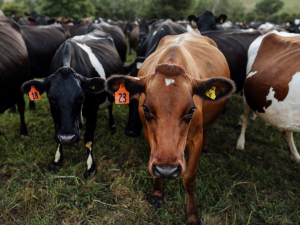Damien O’Connor: NZ united on global trade
When it comes to international trade, politicians from all sides of the aisle are united, says Labour's trade spokesman Damien O'Connor.
 The last known infected property in Mid- Canterbury has been destocked and declared disease-free, taking NZ to zero confirmed infections of M. bovis.
The last known infected property in Mid- Canterbury has been destocked and declared disease-free, taking NZ to zero confirmed infections of M. bovis.
New Zealand may have achieved a world first by effectively eradicating Mycoplasma bovis (M. bovis) - a task that many people claimed was impossible.
Biosecurity and Agriculture Minister Damien O'Connor says the last known infected property in Mid-Canterbury has been destocked, and declared disease-free, taking NZ to zero confirmed infections.
He says while there were brief periods in the past when there were no infections there was still possible cases being investigated.
"This is the first time we've had no cases and no investigations, but it will take five more years to really confirm the absence of M. bovis in our herds," he told Dairy News.
It's taken five years to get to this point and O'Connor says it's the result of hard work, sacrifice, and collaboration between Ministry for Primary Industries (MPI), DairyNZ and Beef+Lamb NZ. O'Connor also acknowledges the hardship which affected farmers and families have felt during this time.
He says no one else in the world had done an eradication programme so the team running it had to constantly adjust, improve, adapt and learn as they went along. O'Connor says they had to develop new tracing systems, which led to the improvement of NAIT and overall it took the efforts of hundreds of people to achieve the outcome we have now.
"I also want to thank the broader sector who've stepped up their animal tracing efforts, allowing us to move the programme on to a new surveillance phase," he says.
During the five-year eradication programme almost 184,000 cattle have been culled, 280 farms depopulated and nearly 3,000 farms subject to movement controls. The Government also paid out $247.6 million in compensation to affected farmers.
O'Connor says the overall cost of the eradication programme was in the order of $650m and was funded jointly by the industry bodies and government. "But the advice I had, and the observations we saw in NZ, the effect on mastitis, lameness, abortion and the requirement to wind back the intensity of our farm systems would have cost billions of dollars in lost production and changed farm systems if we had to farm with bovis," he says.
O'Connor says as NZ becomes clear of active M. bovis infection and work centres on background surveillance, the time is right to transition to a new model to continue to build our farming sector's resilience and strengthen the biosecurity system.
But he says as part of the surveillance programme there will be ongoing milk sampling, probably twice a year when cows are more stressed and are likely to shed M. bovis cells into the milk, so we can detect its presence.
He says there will also be ongoing testing at the freezing works for the national beef herd.
Norwood has announced the opening of a new Tasman dealership at Richmond near Nelson next month.
Buying or building a rural or semi-rural property? Make sure you know where the wastewater goes, says Environment Canterbury.
With collars on more than seven million cows worldwide, Nedap says its standalone launch into New Zealand represents world-leading, reliable and proven smart technology solutions for dairy farmers.
The Meat Industry Association (MIA) is once again looking for game-changing ideas for New Zealand's red meat processing and exporting sector.
Environment Southland is inviting feedback on two bylaws that play a critical role in safeguarding the region's waterways and ensuring the safety of the local community.
While the North Island is inundated with rain, Southland is facing receding water levels as warm weather and lack of rainfall continues.